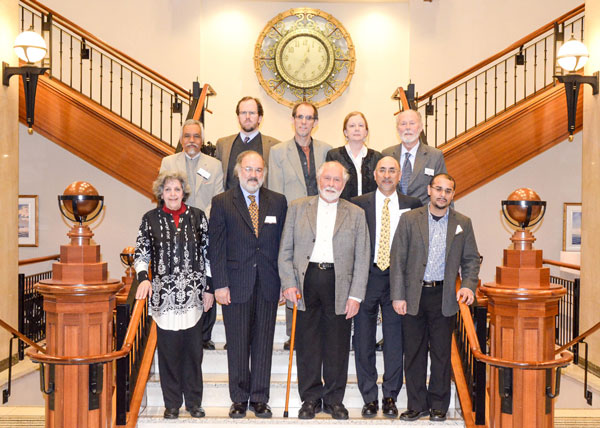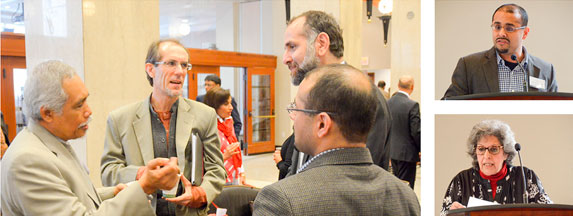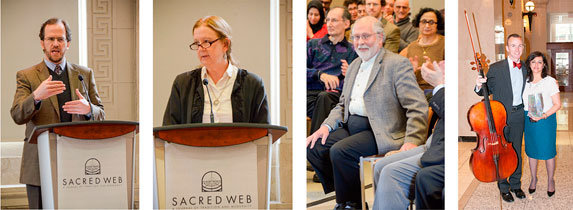Menu:
Sacred Web Conference 2014
April 26th and 27th, 2014
Segal Centre
Vancouver, British Columbia
Conference Summary

Simon Fraser University Beedie School of Business, Vancouver, BC, Canada
April 26 and 27, 2014
Front row (left to right):
Laleh Bakhtiar, Mohammad H. Faghfoory, Seyyed Hossein Nasr (Keynote Speaker),
M. Ali Lakhani (Conference Convener), Mohammed Rustom
Back Row (left to right):
Osman Bakar, Joseph E. B. Lumbard, Patrick Laude, Jane Casewit, Robert D. Crane





Photo credits: Amin Maherali & Sultan Baloo
An Overview of the Sacred Web Conference 2014
By M. Ali Lakhani
The second Sacred Web Conference (the first was held in Edmonton in 2006 at the University of Alberta) took place on the weekend of April 26th and 27th, 2014 at Vancouver, British Columbia's Simon Fraser University downtown campus. The theme of the conference was "Rediscovering the Sacred in our Lives and in our Times", and one full day was dedicated to a symposium on "The Centrality of the Sacred in the Teachings of Seyyed Hossein Nasr", in part to mark the renowned Muslim philosopher's 80th birthday in 2013.
On each day, the conference began with a sampling of sacred music (on Day One by the acclaimed cellist, Joseph Elworthy, who performed a Bach prelude, a Catalonian folk song made famous by Pablo Casals, and John Williams' theme from the movie Schindler's List; and on Day Two by the gifted Iranian Tar player, Ali Razmi, who performed Sufi improvisations for 'sema', in honor of Dr. Nasr), setting the tone for the audience to open their hearts and listen with their inner senses.
The conference was introduced by HRH the Prince of Wales who, in a specially videotaped message recorded earlier at St. James' Palace, spoke of the Sacred as the essential dimension of truth and therefore of understanding, and of the "crisis of perception" in the modern world:
![]() We have lost our way because we can no longer see clearly. And so we have forgotten. A world of parts has replaced a world of wholeness. A world of separation has replaced a world of connectedness and entanglement. The secular has pushed aside the Sacred.
We have lost our way because we can no longer see clearly. And so we have forgotten. A world of parts has replaced a world of wholeness. A world of separation has replaced a world of connectedness and entanglement. The secular has pushed aside the Sacred.![]()
The Opening Address by M. Ali Lakhani, the Conference Convener, used a combination of scripture, metaphysics, and inspirational poetry to explain the relevance of the Sacred, relating it to the Platonic ideas of "Truth, Goodness and Beauty" and to the Vedantic satchitananda, and to comment on the vital importance of rediscovering the Sacred in an increasingly secularized world.
This was followed by the Keynote Address by Dr. Seyyed Hossein Nasr, in which he explored further the meaning of the Sacred, how it can be known through the revealed theophany of scripture, nature, interiority and sacred art, and how, despite the serious consequences of the loss of our awareness of it in many dimensions of our modern world, mankind is not without hope because of the eternal and infinite presence and effulgence of the Sacred.
The afternoon of Day One concluded with three presentations on the Sacred in the modern world. Respected Muslim professor and Datuk, Dr. Osman Bakar from Brunei, spoke on the need to transform secular science to sacred science. Dr. Robert Crane from Qatar, founder of the Harvard International Law Review and a senior member of President Nixon's administration and also President Reagan's appointee as US Ambassador to the Emirates, spoke about the 'meta-legal' principles of pluralism and the potential for their application in the context of the Middle East crisis. Dr. Patrick Laude, professor of Georgetown's foreign service campus in Qatar, presented a paper on the impossible convergence between postmodernism and the Sacred. Dr. Reza Shah-Kazemi of the Institute of Ismaili Studies in London was unable to travel to Canada for health reasons. His paper for this portion of the conference is on the topic of the inner meaning of the invocatory blessing of the Holy Prophet of Islam.
During the evening of the Day One, Dr. Nasr attended at the Ismaili Centre in Burnaby, British Columbia, where he gave the inaugural Ismaili Centre International Lecture on "Religion, Secularism and the Challenge of the Environmental Crises".
Day Two of the conference proceeded, after a musical introduction, with an on-stage interview of Dr. Nasr conducted by Mr. Lakhani. Many in the audience spoke later of this as being one of the highlights as they were able to hear Dr. Nasr speak on a wide-range of subjects from religion to morality to aspects of the modern condition.
This was followed by eight presentations on various aspects of Dr. Nasr's teachings: on modernity and Islamic fundamentalism (by Dr. Joseph Lumbard), on perennial psychology (by Dr. Laleh Bakhtiar), on the sacrality of nature (by Dr. Osman Bakar), on sacred education (by Dr. Jane Casewit), on the sacred roots of epistemology (by Dr. Patrick Laude), on the Qur'anic roots of ecology (by a paper read on behalf of Dr. Reza Shah-Kazemi), on Islamic philosophy (by Dr. Mohammed Rustom), and on the reception of Dr. Nasr's teachings in Iran (by Dr. Mohammad Faghfoory). Dr. Nasr then commented on each of the presentations, and concluded with personal reflections about his life's work.


